The Decline and Fall of TIFF
© By John Arkelian
Yes, that’s right, TIFF, better known as the Toronto International Film Festival, has a new moniker, one that better describes its unattractive new modus operandi. Forget about the current cinematic fad known as 3-D; the festival does it one better, having cornered the market on “4-D:” “Discourteous, Disorganized, Disingenuous, and Disdainful.” Gone are the days of civility, a warm welcome, and public transparency. They’ve been left on the cutting-room floor. In their place stands a coldly arrogant edifice comprised in equal parts of hype, hubris, avarice, and a haughty disdain for all but the favored few. The people who run the festival fawn over supposed celebrities, the self-anointed Demigods of Tinsel Town before whom they shamelessly bow, even as they show nothing but contempt for the rest of us mere mortals. Sure, there are still some good movies at the festival; but there have been fewer and fewer truly outstanding ones in recent years. Quality is as endangered a species as civility at TIFF. Cinephiles will have a far happier experience if they stay home and rent quality films on DVD or through one of the lawful download-providers.
Like too many of its movies in recent years, the festival leaves us cold with its endless queues; the over-crowding and insufficiency of repeat screenings that make it all but impossible to get into the films you want to see; the lamentable caste system pervading the whole affair that dismissively looks you up and down to determine if you’re a ‘somebody’ or (more likely) not and treats you accordingly (who’d have guessed that even the attendant press corps is ranked according to perceived import and that its members are susceptible to being demoted from prioritized to plebian without warning, explanation, or right of appeal); the excessive price tag on everything from admission tickets to the program book (a book whose production costs ought to be more than defrayed by its many full-page color corporate ads); the over-abundance of immodest hype; the general air of corporatism and clubbiness that distances the whole thing from ordinary folks; an inexplicable doltish readiness to tolerate the ubiquitous use in darkened cinemas of cell phones and text devices, whose display screens beam a blinding light into the unwilling eyes of other filmgoers; and an unseemly preoccupation with a planned $196 million corporate headquarters cum showpiece, the so-called “Lightbox.” Just what an ostensibly not-for-profit organization is doing (besides empire-building) devoting so much of its energy and resources to the pursuit of a massive real estate development in pricey downtown Toronto is hard to fathom. It seems that the palatial new digs will not come close to being able to accommodate all of the festival screenings (there’s been a crying need for years for more screens, bigger venues, and far more repeat-screenings). That being so, what in the name of the hallowed silver screen is the festival doing as a would-be player in the worlds of high-finance and real estate development? Sadly, it seems that the curtain has fallen on the festival Torontonians once knew and loved. If you’re wise, you’ll avoid the unrecognizable thing that has usurped its place like the proverbial plague.
2009 Toronto International Film Festival
© By John Arkelian
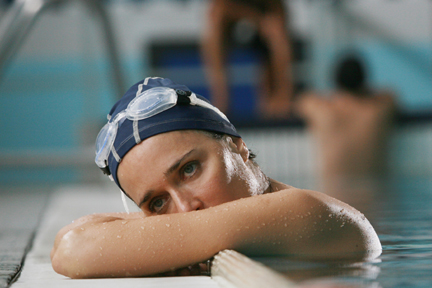
Valeria Golino in "Giulia Doesn't Date at Night"
There were fewer outstanding films on view this year than at some festivals past, but Toronto’s annual celebration of world cinema did offer nuggets like the gentle and tender “La Donation” from Canada’s own director par excellence Bernard Emond. Here’s a sampling of what was on offer this year.
“Air Doll” [“Kuki Ningyo”] (Japan) (B): An inflatable air doll, designed for close encounters of the polyethylene kind, suddenly comes to life and sets out to explore her world with childlike curiosity. Doona Bae brings innocence, fragility, and wistfulness to the title role in what has to be the year’s most unique love story: ‘Having a heart is heart-breaking.’ The whole sex-toy aspect of the story is, happily, eclipsed by the surprisingly poignant look at an innocent abroad in a not so innocent world.
“Antichrist” (Denmark/Sweden/France/Italy) (F): When a disemboweled fox tells us that, “Chaos reigns,” we know the result is going to be far from benign. This grotesque, harrowing tale of a man (Willem Dafoe) and woman (Charlotte Gainsbourg) who lose their child and descend into madness has images and situations that are so wretchedly ugly they
can only be called vile. Director Lars von Trier has done outstanding work with difficult subject matter in the past, in films like “Breaking the Waves,” “Dogville,” and “Manderlay,” and, truth be told, at least two of that earlier trio unquestionably fell into the love ’em or hate ’em category. This critic lauded all three of those earlier films, but the sheer repugnant ugliness of “Antichrist” is beyond the pale. It has a lyrical opening, shot in slow-motion black-and-white and accompanied by opera, as three china figurines representing “pain, grief, and despair” decoratively prefigure the tragedy that is about to propel the violent unravelling of two psyches. But things quickly take a turn for the revolting, with images and events that are so stomach-turning, so grotesquely obscene, it is impossible to tastefully describe them here. It seems von Trier has been overcome by the very chaos he seeks to chronicle. Avoid this film like the plague!

Paprika Steen in "Applause"
“Applause” (Denmark) (B+/A-): A diva of the stage wins acclaim for her precisely calibrated performance in the play “Who’s Afraid of Virginia Woolf;” but she’s bereft of her lines in real life – impulsive, choleric, and pathetically out of her element when it comes to dealing with real people, including the young sons she lost to a broken marriage. She doesn’t know
when to turn off her theatricality or her haughty disdain for others. Proclaiming that, “I hate ordinary people,” Thea lives her life accordingly, and the result is a life of chaos. It’s an up close and personal look at dysfunction personified, and Paprika Steen delivers the best performance by any actress at this year’s festival, in a role that doesn’t shy away from its
intimately unflattering encounter with a damaged, self-destructive, and lonely soul. Steen makes the film, in Martin Pieter Zandvliet’s impressive solo directorial debut.
“Balibo” (Australia) (B-): When five Western journalists disappear during the brutal 1975 Indonesian invasion of East Timor (yet another instance of the world standing idly by in the face of naked aggression and mass murder), an Australian journalist named Roger East (Anthony LaPaglia) tries to uncover the truth about their fate. His quest is interrupted by frequent flashbacks to the quintet for whom he is looking, but those flashbacks are a needless distraction. We don’t really get to know the five younger journalists; so, there’s little to be gleaned from constantly interrupting the more interesting story of the world-weary middle-aged journalist who gets reluctantly drawn into the nastiness of Indonesia’s invasion of its tiny neighbor. The indifference and/or complicity of the outside world is depressingly familiar from other times and places; but LaPaglia’s crumpled, doomed truth-seeker is what’s worth seeing in this fact-based film.
“Creation” (U.K.) (C): Charles Darwin (1809-82) is the oft-cited and just as rarely read (or understood) English naturalist whose voyage to the Galapagos Islands and beyond yielded “On the Origin of Species” (1859), a book that advanced the idea of ‘natural selection,’ that is, the process by which biological organisms adapt over time to changes in their environment. Adherents and opponents alike have long assumed that the ideas advanced by Darwin removed God from our understanding of our own origins. Curiously, the film skirts both the scientific theorems and resulting controversy, opting instead to personalize them in a story about the trauma to Darwin and his family caused by the loss of a beloved daughter, Annie (precociously portrayed by Martha West), and Darwin’s (Paul Bettany) reluctance to injure the religious convictions of his wife (Jennifer Connelly) by promoting scientific theories that might seem to threaten them. The result is well-meaning but rather plodding and dull. Only the aforementioned young West and whomever plays the role of a hydrotherapist make much of an impression.
“Get Low” (U.S.A.) (A-): A man who is driven by grief and guilt to shun the company of others for 40 years and lead a hermit-like existence of self-punishing solitude. His only hope for coming to terms with the past lies in reaching out to others — at the ‘living-funeral’ he orchestrates for himself. The always interesting Robert Duvall delivers the festival’s best male performance in one of the best films of the festival and one of the best films of 2009. He is supported by Sissy Spacek, Bill Murray, and Lucas Black in a film that is quietly poignant and involving, despite its thoroughly understated and introspective tone.
“Giulia Doesn’t Date at Night” [“Giulia non esce la sera”] (Italy) (B/B+): The beguiling Giulia of the title (Valeria Golino) is the chief attraction of this story about a writer (Valerio Mastandrea) who becomes fascinated by a swimming instructor at his daughter’s pool. Turns out, she’s on day-parole for a crime of passion. That explains why she doesn’t date at night. What’s not so clear is the precipitaing reason for Guido’s sudden fixation with her. True, she’s beautiful and enigmatic,
but what prompts him to stray? His casual infidelity is inexplicable. Indeed, he and his wife behave as though they are separated. They’re not, but neither is there any sense of a relationship between the married couple — be it good, bad, or indifferent. That oversight saps the reality from the proceedings, till it comes to resemble an inchoate day-dream about a
lovely woman at a pool, a woman who is as innocently seductive yet as unattainable as a mythological mermaid.
“The Hole” (U.S.A.) (B/B+): When a single parent (Teri Polo) family moves to a new town, the kids (a teen, played by Chris Massoglia, and his younger brother, played by Nathan Gamble) find a mysterious set of padlocked doors on the cellar floor. When they get the doors open, they find themselves face-to-face with an impenetrable black void – and it
seems to be bottomless. Along with the cute girl next door (Haley Bennett), the trio are intrigued and excited by their inexplicable discovery. But they’ve apparently never heard the old saw about curiosity killing the cat. What piques their curiosity soon threatens their lives in an exciting supernatural drama that makes effective, but subdued, of the current
cinematic fad de jour — 3-D. Directed by Joe Dante (“Innerspace” and “Gemlins”).
“I am Love” [“Io sono l’amore”] (Italy) (B/B+): A very gradually paced saga of a wealthy family of Milan industrialists that slowly starts to unravel along the frayed edges of previously unsuspected infidelity and dysfunctional relationships. For there are cracks and strains in the imposing facade of these refined people, hidden passions that undermine the almost stolid solidity that they seem to embody. Tilda Swinton switches from Italian to Russian (neither of them her native tongue) in a nuanced performance. The story is slow-moving but also inexorable; as we get helplessly drawn into these lives, they become less remote and mannered and more immediate and personal.
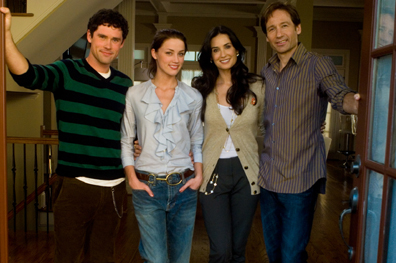
"The Joneses"
“The Joneses” (U.S.A.) (B): Here’s an original, highly entertaining piece of social satire that gives new meaning to the expression, “keeping up with the Joneses.” The eponymous Joneses are newcomers in a very upsacle residential area. Handsome, charming, and outgoing, they seem to epitomize sucess. And they’ve always got the latest in luxury cars, fashion, furnishings, and electronic gadgets. Needless to say, their neighbors are keen to emulate them. The hook? Well, this all too perfect family is not a family at all. Rather, they are salesmen and actors masquerading as a family to hype new products in the most audacious bit of marketing ever attempted. Trouble ensues when they start interacting like a family, even when they’re off-duty, and when their phony model of material success brings some of their admirers to the brink of ruin. The result is a smart, entertaining hoot: “This family’s effed-up,” says David Duchovney as the
pretend pater familias. Demi Moore, Amber Heard, and Ben Hollingsworth round out the too good to be true brood, while Gary Cole and Gleanne Headly are on hand as the bedazzled folks next door. The strangest thing of all is that the story’s premise won’t strike you as all that far-fetched in our age of rampant commercialism.

Kenichi Matsuyama in "Kamui"
“Kamui” [“Kamui Gaiden”] (Japan) (B/B+): An action fantasy story from Japan’s “manga” tradition, this film is a tad disjointed in its opening moments; but, it soon settles into a satisfying story of a ninja warrior who has turned his back on that violent profession and sought peace and normalcy among the simple fishing folk on whose island he washes ashore.
Both the protagonist and the story are anchored in his relationship with the family who take him in – a good-hearted fisherman, his fugitive wife, and their daughter, who falls for the newcomer. The martial arts are competently done, but it’s the relationships that make the story worthwhile. There are inventive visual touches like a bird’s-eye point of view and a startling shark attack.
“Love and Other Impossible Pursuits” (U.S.A.) (B/B+): Here’s a story that focuses on “the other woman,” the woman whose illicit affair lands her with the man and the difficult role of step-mother to his young son. Although this is another instance of a story that fails to adequately delineate the reasons for the adulterous affair that sets things in motion, it does succeed as a character study of a woman who finds that getting the man she loves is only the start of her problems: “It’s the people who love you you’re hardest on.” Natalie Portman (“V for Vendetta”) is not only a vision of beauty, she brings considerable depth and nuance to the role. She’s both perpetrator and victim of circumstance. Not always admirable, she never loses our sympathies. With Scott Cohen, Lisa Kudrow, and young Charlie Tahan, the film was written and directed by Don Roos, from the novel by Ayelet Waldman.
“The Loved Ones” (Australia) (B-): A strange concoction of human drama, coming of age motifs, and bloodily gruesome horror, this one’s not for the squeamish! A boy (Xavier Samuel) in his late teens is haunted by the car crash that took the life of his father. Blaming himself, he has become withdrawn, solitary, and prone to self-destructive behavior. On the plus
side, he’s got an attractive girlfriend (Victoria Thaine) and a caring mother. Trouble is: He’s also got a secret admirer in the person of an odd girl from school. On the eve of the school prom, she and her father (who is as howlingly mad as she is) kidnap the protagonist for some horrific sadism. They’re a father and daughter tag team of serial torturers and killers, and they’ve just found their latest victim. It’s meant to be wildly over the top, of course; but the admirably strong characterization is squandered on stomach-churning gore. Even the dark stuff might have been fun, if it had been a little (no, make that a lot) less gruesome. In the end, much of the potential succumbs in the face of a relentless gross-out of horrific proportions.
“Mall Girls” [“Galerianki”] (Poland) (B/B+): A gritty story of a good girl (Anna Karczmarczyk) in bad company, as pre-high school girls sell themselves for petty cash. The result isn’t pretty, with ‘tween’ girls offering sexual services to buy cell-phones and clothes. The lifestyle it depicts is crude and squalid, and even uglier due to the underage nature of its
players. But writer/director Katarzyna Rostaniec’s feature film debut is also very well acted.
“The Men Who Stare at Goats” (U.S.A.) (B-/B): Harnessing the power of the mind to fell goats (and hamsters), disperse clouds, and confuse one’s opponent is the objective of would-be “Jedi warriors” played by George Clooney, Jeff Bridges, Ewan McGregor, and Kevin Spacey. The result is a zany romp in the land of the deliberately odd that plays out like a combination of acid-trip, hippie-fantasy, and theater of the absurd. This one’s decidedly not for all tastes!
“The Mother” (South Korea) (C+): When a mentally disabled young man is accused of murder, his devoted mother (Won Bin) moves heaven and earth to exonerate him. How far will a mother go to protect her child? As far as she has to. This film attracted considerable ‘buzz’ at the festival, but it falls short of the mark with a rather plodding narrative that turns unexpectedly nasty. Director Bong Joon-ho did better work with 2006’s likewise uneven “The Host.”
“Nymph” [“Nang Mai”] (Thailand) (D): A dysfunctional, seemingly loveless couple on a camping trip wander aimlessly (and separately) through the woods for no discernible reason and fall under the silvan setting’s none too apparent spell. The male goes missing, abducted perhaps by some tree-spirit made flesh. He reemerges later, but is it really him? Ho
hum! The idea, whatever it is, may have had potential, but the result unfolds with all the drama and alacrity of a leaf unfolding ever so slowly in the sunshine. Deadly dull, it gets minor points only for atmosphere. It ought to have been suspenseful, mysterious, and maybe a little bit seductive; instead, it’s just a misfire – nothing but empty portent.
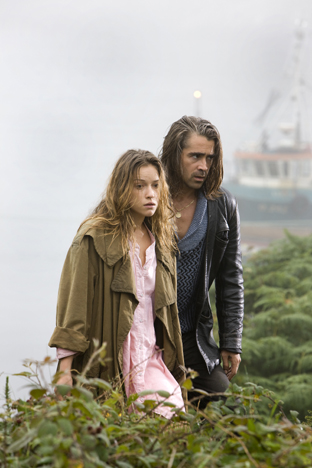
Alicja Bachleda & Colin Farrell in "Ondine"
“Ondine” (Ireland/U.S.A.) (B): This mostly charming picture wastes no time in setting up its enchanting premise. In its opening moments, a fisherman named Syracuse (Colin Farrell) discovers a beautiful young woman (Alicja Bachleda) in the nets he has just hauled from the sea. She’s beautiful, subtly exotic, and mysterious, and she’s intent on shunning the
company of all others. Her accidental rescuer gives her sanctuary in an unused cottage. When his precocious, wheelchair-bound young daughter (the delightful Alison Barry) gets wind of these developments, she declares the mysterious newcomer to be a “selkie,” a mythical being that turns from seal to woman. One thing is clear: Ondine represents something serendipitous and transcendent in the quotidian lives of these ordinary folk. Marred only by the later intrusion of mundane elements like gun-wielding drug smugglers, the film is a sparkling example of the role of the unexpected and whimsical in enriching the fecundity of our imagination. It delivers both a charming premise and the festival’s best performance by a child.
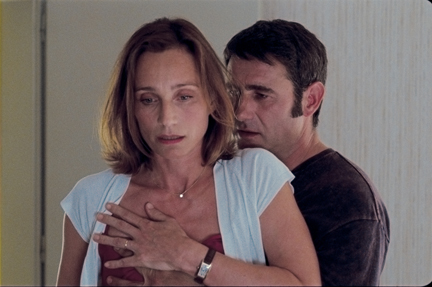
Kristin Scott Thomas & Sergi Lopez in "Partir"
“Partir” [“Leaving”] (France) (B): A seemingly contented married woman (the first-rate Kristin Scott Thomas of last year’s stellar “Il y a longtemps que je t’aime”) becomes hopelessly smitten with a carpenter (Sergi Lopez), bringing ruin down upon everyone concerned: “I hate myself for hurting all of you, but I can’t help it! Let me go.” Thomas is always flawless, but the problem here is that the film doesn’t convince us about the appeal, let alone urgency, of her affair with this man. Maybe part of the problem is that Lopez, fresh from his role as the vicious fascist captain in “Pan’s Labyrinth,” doesn’t exactly exude warmth. But, more than that, there simply aren’t enough clues as to what prompts the protagonist to embark upon an affair in the first place: Her motivations remain a cipher, to the detriment of the story.
“Together” [“Sammen”] (Norway) (A-): Writer/director Matias Armand Jordal’s feature film debut provides a stark lesson in what happens when tragedy tears people apart. In this case, a man (Fridtjov Saheim) is so devastated by the sudden loss of his wife (a vivacious Evy Kasaseth Rosten) that he loses the ability to cope – with work, sobriety, or even his responsibilities as a parent. While a North American film might have had the surviving parent and child (Odin Waage, doing admirably quiet and restrained work) forging a closer bond through their shared grief, this Scandinavian take on family breakdown is rather darker, with the father selfishly hoarding his own grief, excluding his 12-year old son, and ultimately abandoning himself to despair and the boy to institutional care. Father: “I can’t be your dad anymore, Paul. I love you with all my heart, but I can’t be your dad. I can’t manage.” Son: “But you are my dad.” “Together” is not only one of the best films of the festival, it is easily one of the best films of the year (from any country), with fine performances by all concerned. The acting, like the direction, is admirably visceral, with an immediacy and authenticity that takes us, compellingly, into the very heart of these troubled characters. We look forward to Jordal’s next film with eager
anticipation.
“Valhalla Rising” (Denmark/U.K.) (B): A silent Viking warrior (Mads Mikkelsen) recently freed from captivity, a young boy, and a longboat full of Norsemen recently converted to Christianity set out on a journey into the unknown. Their ostensible destination may be the Holy Land, but where they actually end up is anyone’s guess. It may be the New World; and the natives are unmistakeably hostile. Don’t let the religious convictions of most of this crew fool you: They’re bellicose warriors, and, to borrow a phrase, there will be blood! This is a strange, almost hallucinogenic voyage into the unknown. It gets credit for its eerie atmosphere. When the fog finally lifts, neither these voyagers nor us have any idea where they are. All we do know is that they are in mortal and moral peril – from the elements, from the mostly unseen indigenous inhabitants and from internal division among themselves. Dark, and slow, and awfully strange, this moody ode on courage (in the face of doom) and belief references an eclectic host of other cinematic sources.
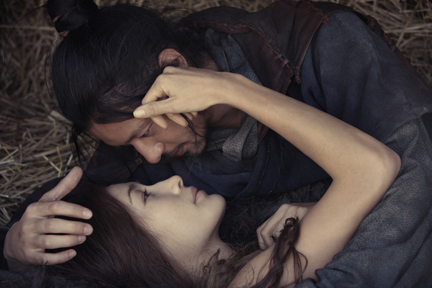
"The Warrior and the Wolf"
“The Warrior and the Wolf” [“Lang Zai Ji”] (China) (C-): Set in ancient times, an army is forced to over-winter far from home among mountain villagers. One of the warriors (Joe Odagiri) takes a widowed local woman (Maggie Q) to his bed in a story that combines epic romance, warfare, and mythological beliefs about wolves. The result is simultaneously overblown and underwhelming.
“The Waiting City” (Australia) (B-): There’s nice local flavor in this story about an Australian couple (Radha Mitchell of “Pitch Black” and Joel Edgerton) who wait in Calcutta to bring home the Indian child they are adopting, while things start to go wrong. But the scripting is inconsistent – sometimes contrived, sometimes heavy-handed, sometimes oddly vague.
There is no explanation about why this couple is sexually estranged from each other, or, for that matter, how they’d ever be a couple in the first place. They seem to have next to nothing in common: He’s a laid-back, sensitive musician; she’s a type-A lawyer. The result is buoyed a bit by a solid cast and local atmosphere: “You must act out of love, not desperation or need.”
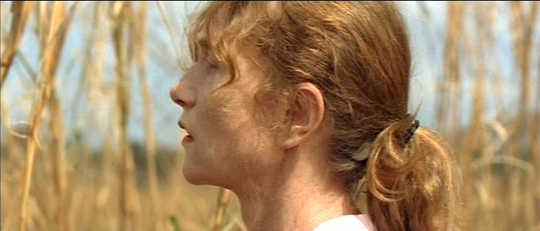
Isabelle Huppert in "White Material"
“White Material” (France) (C-): Ugh! What on earth is going on in this disjointed mess? Admittedly, Isabelle Huppert gives a good performance as a single-minded woman who is determined to keep her coffee plantation (in an unnamed African country) up-and-running, despite the murder and mayhem precipitated by a brutal civil war. Such iron-willed resolve might be admirable in other circumstances; but here it degenerates into monomania – an irrational fixation on a single objective, regardless of the ruinous toll it takes on oneself and others. Indeed, the whereabouts (let alone fate) of her immediate family scarcely figure in this woman’s thoughts, for she has given herself over, body and soul, to the idea of her farm and the false sense of order it represents. Troubles abound: People drift in and out of Maria’s orbit; often absenting themselves from the story for long stretches without explanation. You’d think the anti-heroine would run into her immediate family more often. Then again, they’re a hopelessly dysfunctional bunch. There are armed brutes on all sides, invading her very house with impunity; meanwhile Maria’s obsessive need to bring in the crop seems more like madness than a comprehensible objective. It’s simply recklessness in aid of nothing, with nary a sign of emotion until the last moments of the film. Directed and co-written by Claire Denis, who was raised in Africa.
